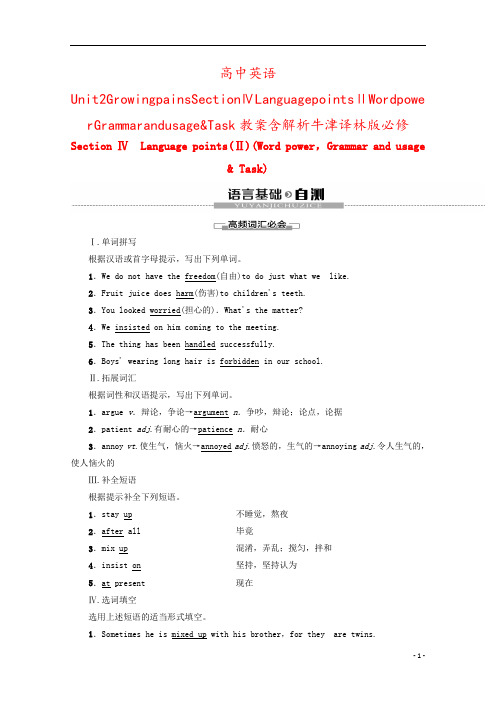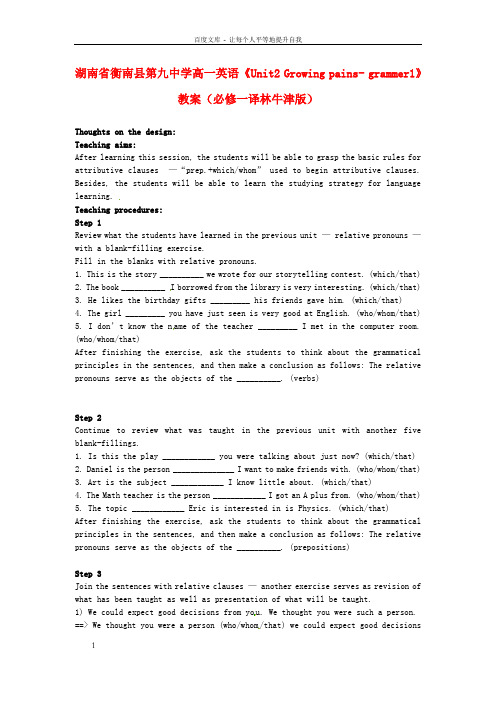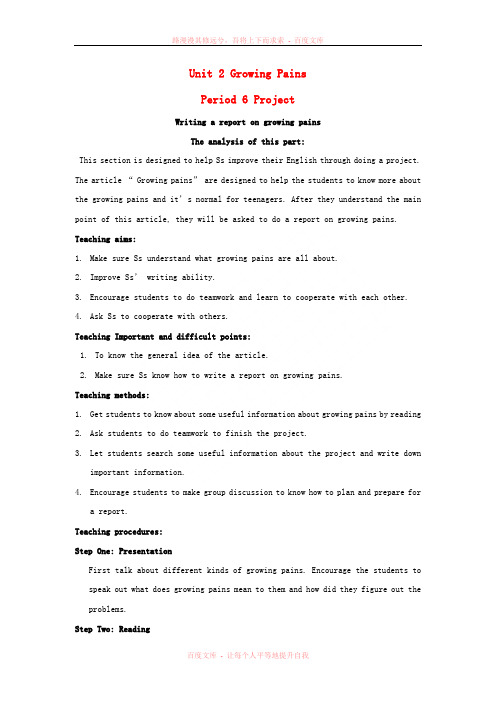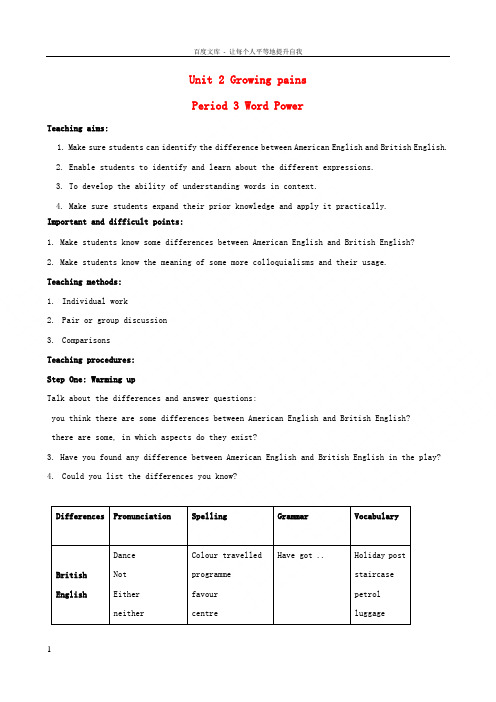2015年高中英语 Unit2 Growing pains Grammar and usage教案 牛津译林版必修1
- 格式:doc
- 大小:38.00 KB
- 文档页数:4

高中英语Unit2GrowingpainsSectionⅣLanguagepointsⅡWordpowe rGrammarandusage&Task教案含解析牛津译林版必修Section ⅣLanguage points(Ⅱ)(Word power,Grammar and usage& Task)Ⅰ.单词拼写根据汉语或首字母提示,写出下列单词。
1.We do not have the freedom(自由)to do just what we like.2.Fruit juice does harm(伤害)to children's teeth.3.You looked worried(担心的).What's the matter?4.We insisted on him coming to the meeting.5.The thing has been handled successfully.6.Boys' wearing long hair is forbidden in our school.Ⅱ.拓展词汇根据词性和汉语提示,写出下列单词。
1.argue v.辩论,争论→argument n.争吵,辩论;论点,论据2.patient adj.有耐心的→patience n.耐心3.annoy vt.使生气,恼火→annoyed adj.愤怒的,生气的→annoying adj.令人生气的,使人恼火的Ⅲ.补全短语根据提示补全下列短语。
1.stay up 不睡觉,熬夜2.after all 毕竟3.mix up 混淆,弄乱;搅匀,拌和4.insist on 坚持,坚持认为5.at present 现在Ⅳ.选词填空选用上述短语的适当形式填空。
1.Sometimes he is mixed up with his brother,for they are twins.2.They stayed up all night discussing questions.3.I don't want to go to Shanghai for further education at present.4.He insisted on going alone by himself.背教材原句记句式结构仿写促落实1.I hate it when that happens!我讨厌发生这事!it是形式宾语,when that happens是真正的宾语。

湖南省衡南县第九中学高一英语《Unit2 Growing pains- grammer1》教案(必修一译林牛津版)Thoughts on the design:Teaching aims:After learning this session, the students will be able to grasp the basic rules for attributive clauses —“prep.+which/whom” used to begin attributive clauses. Besides, the students will be able to learn the studying strategy for language learning.Teaching procedures:Step 1Review what the students have learned in the previous unit — relative pronouns —with a blank-filling exercise.Fill in the blanks with relative pronouns.1. This is the story __________ we wrote for our storytelling contest. (which/that)2. The book __________ I borrowed from the library is very interesting. (which/that)3. He likes the birthday gifts _________ his friends gave him. (which/that)4. The girl _________ you have just seen is very good at English. (who/whom/that)5. I don’t know the n ame of the teacher _________ I met in the computer room. (who/whom/that)After finishing the exercise, ask the students to think about the grammatical principles in the sentences, and then make a conclusion as follows: The relative pronouns serve as the objects of the __________. (verbs)Step 2Continue to review what was taught in the previous unit with another five blank-fillings.1. Is this the play ____________ you were talking about just now? (which/that)2. Daniel is the person ______________ I want to make friends with. (who/whom/that)3. Art is the subject ____________ I know little about. (which/that)4. The Math teacher is the person ____________ I got an A plus from. (who/whom/that)5. The topic ____________ Eric is interested in is Physics. (which/that)After finishing the exercise, ask the students to think about the grammatical principles in the sentences, and then make a conclusion as follows: The relative pronouns serve as the objects of the __________. (prepositions)Step 3Join the sentences with relative clauses — another exercise serves as revision of what has been taught as well as presentation of what will be taught.1) We could expect good decisions from yo u. We thought you were such a person. ==> We thought you were a person (who/whom/that) we could expect good decisionsfrom.==> We thought you were a person from whom we could expect good decisions.2) You were to buy dog food with the money. The money is gone.==> The money (which/that) you were to buy dog food with is gone.==> The money with which you were to buy dog food is gone.After finishing the exercise, ask the students to think about the grammatical principles in the sentences, and then make a conclusion as follows: When the relative pronoun is the object of the preposition, we use preposition to begin an attribu tive clause, which is, preposition + which/whom. In this case, the relative pronoun, which or whom, cannot be replaced with “that” or “who”.Besides, the relative pronoun cannot be left out.Step 4Consolidating exercises:1. Review what has been done in step 2, and ask the students to rewrite the sentences according to the newly-learned rules.1) Is this the play about which you were talking just now?2) Da niel is the person with whom I want to make friends.3) Art is the subject about which I know little.4) The Math teacher is the person from whom I got an A plus.5) The topic in which Eric is interested is Physics.2. Fill in the blanks with “prep.+ which/whom”:1) Are you interested in any songs ____ _____ you’ve listened. (to which)2) Tomorrow is a particular day ____ _____ his daughter will get married. (on which)3) This is the knife ____ _____ I usually cut bread. (with which)4) We can’t live without the sun ____ _____ we get heat and light. (from which)5) The subject ____ _____ Eric is interested is physics. (in which)6) Do you know the girl ____ _____ our head teacher is shaking hands? (with whom)7) I can’t find my dictionary ____ _____ I paid over $100. (for which)8) This is the good car ____ _____ I spent all my money. (on which)9) She is the teacher ______ _______all his students show respect. (for/to whom)10) The teacher ____ _____ you have been waiting is coming in a minute. (for whom)Step 5Translate the following sentences:你有无看见那座红屋子,屋子前有一棵大树。

高一英语教案:Unit 2 Growing pains(2)〔译林牛津版〕素材〔含教案和练习〕 Unit 2 Growing pains一. 教学内容:Unit 2 Growing Pains 〔II〕二. 教学目标:把握Unit 2语法定语从句三. 教学重难点:把握介词+关系代词引导的定语从句把握关系副词引导的定语从句〔一〕定语从句复习用定语从句把以下句子连接成一个句子1. The book is mine. He is reading the book.The book (which/that) he is reading is mine.2. I like the girl. The girl is wearing a red skirt.I like the girl who is wearing a red skirt.3. She is the student. We saw her yesterday.She is the student (who/whom/that) we saw yesterday.4. The athlete is a famous runner. You talked to him.The athlete who you talked to is a famous runner.5. I have lost the book. He gave me it yesterday.I have lost the book (which/that) he gave me yesterday.6. I have seen the film. You talked it about last night.I have seen the film (which/that) you talked about last night.7. I threw the chair. Its legs are broken.I threw the chair whose legs are broken.介词+关系代词引导的定语从句用定语从句把以下句子连接成一个句子1. This is the teacher. Weve learned a lot from her.This is the teacher (whom/who/that) weve learned a lot from. This is the teacher from whom weve learned a lot.2. The policeman is a friend of mine. Mr Henry is talking with him in the office.The policeman (who/that/whom) Mr Henry is talking with in the office is a friend of mine.The policeman with whom Mr Henry is talking in the office isa friend of mine.3. The ladder began to slip. I was standing on the ladder. The ladder (which/that) I was standing on began to slip. The ladder on which I was standing began to slip.4. Great changes are taking place in the city. They live in the city.Great changes are taking place in the city (which/that) they live in.Great changes are taking place in the city in which they live.5. This is the library. I borrowed Harry Potter from thislibrary.This is the library (which/that) I borrowed Harry Potter from. This is the library from which I borrowed Harry Potter.总结:关系代词在从句中作宾语时,介词可提至关系代词前,构成"介词+which/whom从句'结构。
![[推荐精选]Unit2 Growing Pains- Grammar](https://img.taocdn.com/s1/m/88dd8831e87101f69e3195cb.png)
Unit2 Growing Pains- Grammar &usage教案www.5ykj.comUnit2GrowingPains-Grammar&usage教案Teachingobjectives:Tolearnhowtouseapreposition+whic h/whomtobeginanattributiveclauseandhowtouserelative adverbsinattributiveclausesImportantanddifficultpoi nts:Howtochoosesuitableprepositionsinanattributivec lause.Teachingprocedures:Step1.RevisionHwchecking:u nderstandingsomecolloquialismsStep2.GrammarandUsage Thegrammariteminthisunitwillstilldealwithattributiv eclauses.youarefirstexpectedtolearnabouttheattribut iveclauseintroducedbyapreposition+whichandapreposit ion+whom.youwillalsolearnhowtouseattributiveclauses introducedbytherelativeadverbswhen,whereandwhy.Step 1:Prep.+which&prep.+whomAnattributiveclausecanb eintroducedbyaprep.+which/whomandlet’sseeinwhatcircumstancesthesetwoformsareused.1.Point 1onpage28Pointouttheantecedentsandtheirfunctionsint hefollowingtwosentences.wethoughtyouwereapersonfromwhomwecouldexpectgooddec isions.Themoneywithwhichyouweretobuydogfoodisgone.2.Point2.ThemathsteacheristhepersonfromwhomIgotanAplus.ArtisthesubjectaboutwhichIknowlittle.3.Points3and4.DadisapersontowhomIcaneasilytalk.Dadisapersonwhom/that/whoIcaneasilytalkto.DadisapersonIcaneasilytalkto.Note:Theprepositionint heattributiveclausemustbeusedwhethertherelativepron ounsareleftoutornot.4.Point5.ThesentencesinPoint5sh owushowtousetheattributiveclausetomodifytheantecede ntway.NowtheexercisesinPartsAandBonpage29.ForPartA, youshouldpayattentiontotheantecedenttoseewhetheritr eferstoaperson/peopleorsth./pleteeachsent enceaccordingtoitsmeaning.AnswersA1c2d3b4a5e6h7f8gB1which2which3about4from5fromResourcesyoumaywanttoknowmoreaboutinwhatsituat ionaprep.+which/whomshouldbeusedandhowtouseaproperp reposition.moresentenceswithattributiveclausesintro ducedbyaprep.+which/whomcanbeusedasexamples.*Thepen withwhichIwritemyhomeworkeverydayisbroken,soI'llhav etobuyanewone.*canyoupleasegivemesomepaperonwhichIc anwriteanote?*Doyouknowthewomanwithwhomourteacheris talking?*Doyouknowthenameofthegirlaboutwhomourteach eristalking?*ThemanfromwhomIboughttheoldpictureisov ereightyyearsold.Step2:Relativeadverbs:when,wherean dwhyHereyouwilllearninwhatconditionwhen,whereorwhyi susedtointroduceanattributiveclause.Andlet’sseewhatotherwordscanbeusedtoreplacewhen,whereorwhy .1.whenthenounortheantecedentreferstoacertainperiodoftimeandisusedastheadverbialoftimeintheattributive clause,whenisusedtointroducetheclause.Herewhenisuse dasarelativeadverb.Let’sreadthethreeexamplesentencesinPoint1onpage30andtel lwhatwhenreferstoineachofthesentences.InSentence1,whenreferstoonthatday.InSentence2,whenreferstoatthatmoment.InSentence3,whenreferstoatthattime.Sothesesentences canbeexpressedinsomeotherwaysasthefollowing: Doyourememberthedayonwhichweleftyouincharge?IoftenthinkofthemomentatwhichIsawtheUFo.IrememberthetimeatwhichEricwonthatspeechcompetition .2.whenthenounortheantecedentreferstoaplaceandisuse dastheadverbialofplaceintheattributiveclause,wherei susedtointroducetheclause.Herewhereisusedasarelativ eadverb.ReadthefourexamplesentencesinPoint2andtellw hatwherereferstoineachsentence.InSentence1,wherereferstointhehouse.InSentence2,wherereferstointhecountry.InSentence3,wherereferstointhecity.InSentence4,wher ereferstointhefamily.Sothesesentencescanbeexpressed insomeotherwaysasthefollowing:Thepolicesearchedtheh ouseinwhichthethiefhadstayed.mikewantstoworkinacoun tryinwhichtherearealotofrainforests.IsShanghaitheci tyinwhichhewasborn?Thisisnotafamilyinwhichbadbehavi orgoesunpunished.3.whenthenounortheantecedentisthew ordreasonandisusedastheadverbialofreasonintheattrib utiveclause,whyisusedtointroducetheclause.Herewhyis usedasarelativeadverb.ReadthetwoexamplesentencesinP oint3.4.ReadthesentencesinPoint4andlearnhowtosaythe sentenceswithattributiveclausesintroducedbywhen,whe reorwhyinmoreformalEnglish.wecanuseinwhichinsteadof where,onwhichinsteadofwhenandforwhichinsteadofwhyin thethreesentences.answerswhy/forwhichwheninwhichwhere/inwhichwhen/onwhichAnswersPartc11.whom2.why3.that/which4.whom5.that/which6.whom7.where8.when9.that/which0.wherePartc21.that---which/去掉in2.去掉it3.which---why4.that---where5.that---where6.在theperson加who/that7.which---that/在which前加in8.that---whenwhich---when0.that---whyResourceswhenorwherecan'tbeusedtointrod uceanattributiveclauseiftheantecedentisusedasthesub jectorobjectintheclausethoughtheyrefertoatimeorapla ce.Itisthesamewiththewordreason.*Shanghaiisthefirst citythatEricvisitedinchina.*Thecitywhich/thatgivesE ricadeepimpressioninchinaisShanghai.*Hewillalwaysre memberthedaysthat/whichhespentinchina.*Imustgethome beforejanuary22,whichisthefirstdayoftheSpringFestival.*Thereasonthat/whichhegaveusisgoodenough.Step4:H omework:RecordafterTeaching________________________ ___________________________________________________ ___________________________________________________ ___________________________________________________ ___________________________________________________ ___________________________________________________ ___________________________________________________ __www.5ykj.com。

Unit 2 Growing PainsPeriod 6 ProjectWriting a report on growing painsThe analysis of this part:This section is designed to help Ss improve their English through doing a project. The article “Growing pains”are designed to help the students to know more about the growing pains and it’s normal for teenagers. After they understand the main point of this article, they will be asked to do a report on growing pains. Teaching aims:1.Make sure Ss understand what growing pains are all about.2.Improve Ss’ writing ability.3.Encourage students to do teamwork and learn to cooperate with each other.4.Ask Ss to cooperate with others.Teaching Important and difficult points:1.To know the general idea of the article.2.Make sure Ss know how to write a report on growing pains.Teaching methods:1.Get students to know about some useful information about growing pains by reading2.Ask students to do teamwork to finish the project.3.Let students search some useful information about the project and write downimportant information.4.Encourage students to make group discussion to know how to plan and prepare fora report.Teaching procedures:Step One: PresentationFirst talk about different kinds of growing pains. Encourage the students to speak out what does growing pains mean to them and how did they figure out the problems.Step Two: Reading1. Let Ss read the article about growing pains. Ask them to find out the answersto the following questions:1)How many different kinds of growing pains are mentioned in this article?Kinds of growing pains:•physical changes•psychological changes•how to fit in society2) How many parts can this article be divided into and what is the main point for each part?Part 1: paras 1-2 Many teenagers feel lonely and are going through many changes. These changes are part of adolescence.Part 2: paras 3-5 Physical changes and psychological changes happen inside teenagers. They become confused and want to know how to fit in society.Part 3: paras 6 Growing pains do not last long.2. Ask the students sort the experiences they discusses before reading, and decide which is physical and which is psychological.3. Explain the language points in the article, especially the words and phrases such as as if, go through, adolescence, misunderstand, along with, in this regard, limit, wisdom, independence, balance, last, challenge.Step Three: Writing a report on growing pains.1.Planninga)Ask Ss to work in groups of four.b)Ask Ss to discuss the four questions given in this part.Which kind of growing pain causes teenagers the most anxiety? Why?Which kind of growing pain is the least understood by teenagers?Which kind of growing pain most interests your group?Are there any other things that can be called growing pains?c)Ask Ss to decide which kind of growing pain their group wishes to doa report on.d)Ask Ss to assign roles to each of them and write their names besidethe following jobs.Research ___________________Write an outline for the report ____________________________Write the report_________________________________Provide art work for the report ________________________2. Preparinga) Those who responsible for doing research to get enough information canlook at the resources as follows:Magazines Experts( health teachers, doctors, etc.)Internet sites Books in the libraryb) The group members will discuss the information found and decide how towrite the report and then make a draft of the outlines of the report.3. Producing a) Ask Ss to write the report by following the outline.b) Proofread the draft and write the report, which should be approved by thewhole group.4. Presentinga) Choose one member to read the report in front of the class.b) Answer the questions the other groups have about their report.c) Display their reports on the wall of the classroom.Step Four Practice writingAsk Ss to finish writing on workbook.Step five: more practiceAsk the students to do other exercises on workbook, if time permits, check the answer together in class.。

Unit 2 Growing painsPeriod 3 Word PowerTeaching aims:1. Make sure students can identify the difference between American English and British English.2. Enable students to identify and learn about the different expressions.3. To develop the ability of understanding words in context.4. Make sure students expand their prior knowledge and apply it practically.Important and difficult points:1. Make students know some differences between American English and British English?2. Make students know the meaning of some more colloquialisms and their usage.Teaching methods:1.Individual work2.Pair or group discussionparisonsTeaching procedures:Step One: Warming upTalk about the differences and answer questions:you think there are some differences between American English and British English?there are some, in which aspects do they exist?3. Have you found any difference between American English and British English in the play?4.Could you list the differences you know?Differences Pronunciation Spelling Grammar VocabularyBritish English DanceNotEitherneitherColour travelledprogrammefavourcentreHave got .. Holiday poststaircasepetrolluggageAmerican English Dance/NotEitherColor traveledprogramfavorcenterHave…vacationstairwaymail gasbaggageStep Two: Dialogue reading and making comparisonsLet students read the dialogue and find out “ Is it in American English or British English?”Sam went back to London to go on with his study in CMHS. He met David on the school campus. Sam: Hi David .How are you?David: Fine, have you just gone back from New York?Sam: Yeah, I went back here last Monday.David: How is your summer holiday, Sam?Sam:Excellent, during my summer vacation I joined a soccer bal l club and I can play it better now.David: Good! I also practised playing footbal l this summer too.Sam: Ok. Please call me at if the students’ union organize a soccer ball match.David: Good idea! You may call me on .Sam: See you!David: Goodbye!Step Three: Vocabulary learning1. Ask students to go through the examples listed in their books first, then get them to comparewhat they know with these examples.2. If possible, invite some students to summarize the differences between American Englishand British English.Step Four: ColloquialismsI. Warming upRead the sentences and express what the colloquialisms mean.1. Though you are busy, could you just lend me an ear for a moment?2. If Huston rockets can win this basketball game by twenty points, I will eat my hat.3. I have never expected lily to act as cool as a cucumber in the traffic accident.4. All the family members come to persuade Jim to change his idea, but he is as stubborn as a mule.5. As a green hand, Robert nearly drove into the grocery on roadside.6. Because Tod failed in his maths exam, he was as quiet as a mouse when his father scolded him. lend me an ear : to listen and pay attention to(倾听:注意;仔细地听)eat my hat: You are 100 percent certain that something will happen.eat (one's) words: to retract something that one has said.(食言:对自己说的话又反悔)as cool as a cucumber: very calm and controlled in difficult situations. (像黄瓜一样凉爽) (就是当一个人碰到困难和麻烦时很冷静、很放松。
Unit2 Growing pains Reading 难句分析1. Mom and Dad arrive back from vacation a day earlier than expected. (P22)爸爸妈妈比预期提早一天度假回来了。
【分析讲解】句中than expected表示“比预期更……”,expected前省略了they are。
如:You did better in the exam than (you had been) expected.你的考试成绩比预期的要好。
相似的结构还有as expected表示“正如预期的那样”。
如:Mary got the first place in the game as expected.正如预料的那样,玛丽在比赛中获得了第一名。
【温馨提示】在Unit 1 P7上有这样一句:CMHS has much more than you expect. 同学们不妨对比一下。
2. Eric runs in after it, followed by a big dog, walking very slowly. (P22)艾瑞克紧随其后跑了进来,后面跟着条大狗,慢腾腾地走着。
【分析讲解】这个句子同时出现了过去分词和V-ing形式。
V-ing形式表示主动或正在发生的动作。
如:Who’s the girl dancing with your brother?同你哥哥跳舞的那个女孩子是谁?过去分词表示被动和完成的动作。
如:We couldn’t agree on any of the problems discussed.我们未能就所讨论的任何问题达成协议。
本句中,过去分词短语followed by a big dog修饰艾瑞克,说明艾瑞克被一条大狗跟着;V-ing短语walking very slowly修饰大狗,说明狗走得很慢。
3. Maybe, but now that he has been so rude to us, I feel like we have to punish him or he won’t respect us. (P23)也许,不过既然他对我们这么粗鲁,我觉得我们得惩罚他一下,要不然,他就不尊敬我们了。
Unit 2 Growing painsPeriod 4 Grammar and usageThe analysis of this part:In this period: The grammar item will still deal with attributive clauses. Ss are first expected to learn about the attributive clauses introduced by a preposition+ which and a preposition+ whom. They will also learn how to use attributive clauses introduced by the relative adverbs when, where and why. Teaching aims:1.Help Ss to know more about attributive clause.2.Help Ss learn about the attributive clauses introduced by a preposition+ whichand a preposition+ whom and make sure they know in what circumstances these two forms are used.3. Help Ss learn how to use attributive clauses introduced by the relative adverbswhen, where and why.Teaching important and difficult points:1.Help the Ss understand the attributive clauses introduced by a preposition+which and a preposition+ whom.2.Help Ss to know the difference between these two kinds of attributive clauses. Teaching methods:1.Presentation and team work.2.Practice.parison.Teaching procedures:Step One: Presentation1.Ask Ss to read point 1-5 to know more about attributive clauses.a)Ask Ss to read point 1 on pla28 to know when to use a pre+ WHICH/WHOMto begin an attributive clause, let them pint out the antecedents inthe two sentences with an attributive clause in each and the functionof the antecedent in the attributive clause.b)Let Ss go over pint 2 and ask them what the two sentences would be informal English.c)Let Ss go over point 3&4. Ask them to make the four example sentencesin different ways.For example: Dad is a person to whom I can easily talk.Dad is a person I can easily talk to.d)Ask Ss to go over pint 5 to know how to use the attributive clause tomodify the antecedent way.2.Ask Ss to look at the screen and know how to use these clauses.Step Two: PracticeAsk Ss to finish Part A and B on page 29 and then check answers together. Step Three: Tips介词+关系代词引导的定语从句1. 关系代词在定语从句中做介词宾语时,从句常由介词+关系代词引导(1) The school (that/which) he once studied in is very famous.(2) The school in which he once studied is very famous.(3) Tomorrow I will bring here a magazine (that/which) you asked for.(4) Tomorrow I will bring here a magazine for which you asked.(5) We’ll go to hear the famous singer (whom/that/who) we have oftentalked about.(6) We’ll go to hear the famous singer about whom we have often talked.注意:1. 含有介词的动词短语一般不拆开使用,如:look for, look after, takecare of等(1) This is the watch which/that I am looking for. (T)(2) This is the watch for which I am looking. (F)2. 若介词放在关系代词前,关系代词指人时用whom,不可用who或者that;指物时用which,不能用that;关系代词是所有格时用whose(1) The man with whom you talked is my friend. (T)(2) The man who/that you talked with is my friend. (F)(3) The plane in which we flew to Canada is very comfortable. (T)(4) The plane in that we flew in to Canada is very comfortable. (F)3. “介词+关系代词”前可有some, any, none, both, all, neither, most, each, few等代词或者数词(1) He loved his parents deeply, both of whom are very kind to him.(2) In the basket there are quite many apples, some of which have gone bad.(3) There are forty students in our class in all, most of whom are from big cities.Step Four: ConsolidationMore PracticeStep Five: Presentation (2)Relative adverbs: When, where and why1.Ask Ss to go through four points on page 30 and know in what condition allthree relative adverbs can be sued and make them know what other words can be sued to replace when, where and why.2.Ask Ss to look at the screen and learn more about this kind of clause.3.Ask Ss to finish exercise on page 31.Step Six: Tips关系副词引导的定语从句1. When指时间,在定语从句中做时间状语(1) I still remember the day when I first came to the school.(2) The time when we got together finally came.2. Where指地点,在定语从句中做地点状语(1) Shanghai is the city where I was born.(2) The house where I lived ten years ago has been pulled down.3. Why指原因,在定语从句中做原因状语(1) Please tell me the reason why you missed the plane.(2) I don’t know the reason why he looks unhappy today.注意:关系副词引导的从句可以由“介词+关系代词”引导的从句替换(1) The reason why/ for which he refused the invitation is not clear,(2) From the year when/in which he was going to school he began to know what he wanted when he grew up.(3) Great changes have taken place in the city in which. /where I was born.Step Seven ConsolidationMore PracticeHomework:To go over what you have learnt in this period.。